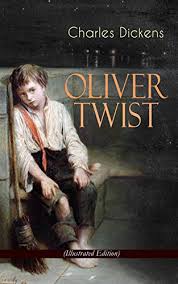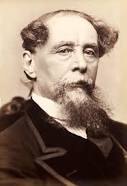Oliver Twist Page #2
Oliver Twist; or, the Parish Boy's Progress is Charles Dickens's second novel, and was published as a serial from 1837 to 1839 and released as a three-volume book in 1838, before the serialization ended. The story centres on orphan Oliver Twist, born in a workhouse and sold into apprenticeship with an undertaker.
Everybody knows the story of another experimental philosopher who had a great theory about a horse being able to live without eating, and who demonstrated it so well, that he had got his own horse down to a straw a day, and would unquestionably have rendered him a very spirited and rampacious animal on nothing at all, if he had not died, four-and-twenty hours before he was to have had his first comfortable bait of air. Unfortunately for, the experimental philosophy of the female to whose protecting care Oliver Twist was delivered over, a similar result usually attended the operation of her system; for at the very moment when the child had contrived to exist upon the smallest possible portion of the weakest possible food, it did perversely happen in eight and a half cases out of ten, either that it sickened from want and cold, or fell into the fire from neglect, or got half-smothered by accident; in any one of which cases, the miserable little being was usually summoned into another world, and there gathered to the fathers it had never known in this. Occasionally, when there was some more than usually interesting inquest upon a parish child who had been overlooked in turning up a bedstead, or inadvertently scalded to death when there happened to be a washing--though the latter accident was very scarce, anything approaching to a washing being of rare occurrence in the farm--the jury would take it into their heads to ask troublesome questions, or the parishioners would rebelliously affix their signatures to a remonstrance. But these impertinences were speedily checked by the evidence of the surgeon, and the testimony of the beadle; the former of whom had always opened the body and found nothing inside (which was very probable indeed), and the latter of whom invariably swore whatever the parish wanted; which was very self-devotional. Besides, the board made periodical pilgrimages to the farm, and always sent the beadle the day before, to say they were going. The children were neat and clean to behold, when they went; and what more would the people have! It cannot be expected that this system of farming would produce any very extraordinary or luxuriant crop. Oliver Twist's ninth birthday found him a pale thin child, somewhat diminutive in stature, and decidedly small in circumference. But nature or inheritance had implanted a good sturdy spirit in Oliver's breast. It had had plenty of room to expand, thanks to the spare diet of the establishment; and perhaps to this circumstance may be attributed his having any ninth birth-day at all. Be this as it may, however, it was his ninth birthday; and he was keeping it in the coal-cellar with a select party of two other young gentleman, who, after participating with him in a sound thrashing, had been locked up for atrociously presuming to be hungry, when Mrs. Mann, the good lady of the house, was unexpectedly startled by the apparition of Mr. Bumble, the beadle, striving to undo the wicket of the garden-gate. 'Goodness gracious! Is that you, Mr. Bumble, sir?' said Mrs. Mann, thrusting her head out of the window in well-affected ecstasies of joy. '(Susan, take Oliver and them two brats upstairs, and wash 'em directly.)--My heart alive! Mr. Bumble, how glad I am to see you, sure-ly!' Now, Mr. Bumble was a fat man, and a choleric; so, instead of responding to this open-hearted salutation in a kindred spirit, he gave the little wicket a tremendous shake, and then bestowed upon it a kick which could have emanated from no leg but a beadle's. 'Lor, only think,' said Mrs. Mann, running out,--for the three boys had been removed by this time,--'only think of that! That I should have forgotten that the gate was bolted on the inside, on account of them dear children! Walk in sir; walk in, pray, Mr. Bumble, do, sir.' Although this invitation was accompanied with a curtsey that might have softened the heart of a church-warden, it by no means mollified the beadle. 'Do you think this respectful or proper conduct, Mrs. Mann,' inquired Mr. Bumble, grasping his cane, 'to keep the parish officers a waiting at your garden-gate, when they come here upon porochial business with the porochial orphans? Are you aweer, Mrs. Mann, that you are, as I may say, a porochial delegate, and a stipendiary?' 'I'm sure Mr. Bumble, that I was only a telling one or two of the dear children as is so fond of you, that it was you a coming,' replied Mrs. Mann with great humility. Mr. Bumble had a great idea of his oratorical powers and his importance. He had displayed the one, and vindicated the other. He relaxed. 'Well, well, Mrs. Mann,' he replied in a calmer tone; 'it may be as you say; it may be. Lead the way in, Mrs. Mann, for I come on business, and have something to say.' Mrs. Mann ushered the beadle into a small parlour with a brick floor; placed a seat for him; and officiously deposited his cocked hat and cane on the table before him. Mr. Bumble wiped from his forehead the perspiration which his walk had engendered, glanced complacently at the cocked hat, and smiled. Yes, he smiled. Beadles are but men: and Mr. Bumble smiled. 'Now don't you be offended at what I'm a going to say,' observed Mrs. Mann, with captivating sweetness. 'You've had a long walk, you know, or I wouldn't mention it. Now, will you take a little drop of somethink, Mr. Bumble?' 'Not a drop. Nor a drop,' said Mr. Bumble, waving his right hand in a dignified, but placid manner. 'I think you will,' said Mrs. Mann, who had noticed the tone of the refusal, and the gesture that had accompanied it. 'Just a leetle drop, with a little cold water, and a lump of sugar.' Mr. Bumble coughed. 'Now, just a leetle drop,' said Mrs. Mann persuasively. 'What is it?' inquired the beadle. 'Why, it's what I'm obliged to keep a little of in the house, to put into the blessed infants' Daffy, when they ain't well, Mr. Bumble,' replied Mrs. Mann as she opened a corner cupboard, and took down a bottle and glass. 'It's gin. I'll not deceive you, Mr. B. It's gin.'
Translation
Translate and read this book in other languages:
Select another language:
- - Select -
- 简体中文 (Chinese - Simplified)
- 繁體中文 (Chinese - Traditional)
- Español (Spanish)
- Esperanto (Esperanto)
- 日本語 (Japanese)
- Português (Portuguese)
- Deutsch (German)
- العربية (Arabic)
- Français (French)
- Русский (Russian)
- ಕನ್ನಡ (Kannada)
- 한국어 (Korean)
- עברית (Hebrew)
- Gaeilge (Irish)
- Українська (Ukrainian)
- اردو (Urdu)
- Magyar (Hungarian)
- मानक हिन्दी (Hindi)
- Indonesia (Indonesian)
- Italiano (Italian)
- தமிழ் (Tamil)
- Türkçe (Turkish)
- తెలుగు (Telugu)
- ภาษาไทย (Thai)
- Tiếng Việt (Vietnamese)
- Čeština (Czech)
- Polski (Polish)
- Bahasa Indonesia (Indonesian)
- Românește (Romanian)
- Nederlands (Dutch)
- Ελληνικά (Greek)
- Latinum (Latin)
- Svenska (Swedish)
- Dansk (Danish)
- Suomi (Finnish)
- فارسی (Persian)
- ייִדיש (Yiddish)
- հայերեն (Armenian)
- Norsk (Norwegian)
- English (English)
Citation
Use the citation below to add this book to your bibliography:
Style:MLAChicagoAPA
"Oliver Twist Books." Literature.com. STANDS4 LLC, 2025. Web. 9 Mar. 2025. <https://www.literature.com/book/oliver_twist_331>.








Discuss this Oliver Twist book with the community:
Report Comment
We're doing our best to make sure our content is useful, accurate and safe.
If by any chance you spot an inappropriate comment while navigating through our website please use this form to let us know, and we'll take care of it shortly.
Attachment
You need to be logged in to favorite.
Log In